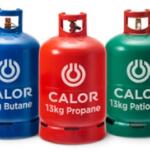
Storing Gas Cylinders Safely at Home
Summer-time is when a lot of us like to go camping or have a barbeque in the back garden.
Whilst these are perfect opportunities to spend time with friends, some key safety rules must not be ignored when storing your gas bottles once the party's over.
Here are a few essential safety rules for storing gas bottles:
1) Always store your gas bottles in an upright position
When stored in the upright position, the valve and regulator are less likely to get damaged. Therefore reducing the risk of gas leaking out of one of the bottles.
2) Store your gas bottles in a place that has good ventilation
When stored in a well-ventilated place, there's less of a chance that gas would accumulate should one of the bottles spring a leak.
3) Make sure your gas bottles are stored away from any heat source
This might sound a bit silly, but it is very important to keep gas bottles well away from a heat source, this will considerably reduce the risk of the bottle catching fire and exploding.
4) Keep your gas bottles outdoors away from the building's entrance and exit points
Not only are the gas bottles out of the way of people coming in and out of the building, but keeping them outdoors ensures they are in a place where air circulates freely. Therefore, keeping yourself and others safe.
Other points to consider
There are other things to consider as well when storing gas bottles. It is not permitted to keep more than 15kg of butane indoors if it's being used for portable gas heaters, for example. Propane, on the other hand, is only allowed inside commercial and industrial buildings on a temporary basis, for example to power a welder's blowtorch. The rest of the time, propane bottles must be stored outside. It is also important to note that use of gas bottles isn't permitted in high-rise office blocks or residential buildings as an explosion could endanger all the occupants.
When storing gas bottles, it is essential to keep all these rules in mind. A gas cylinder that isn't stored properly is potentially dangerous and could put yours and your family's lives at risk.
